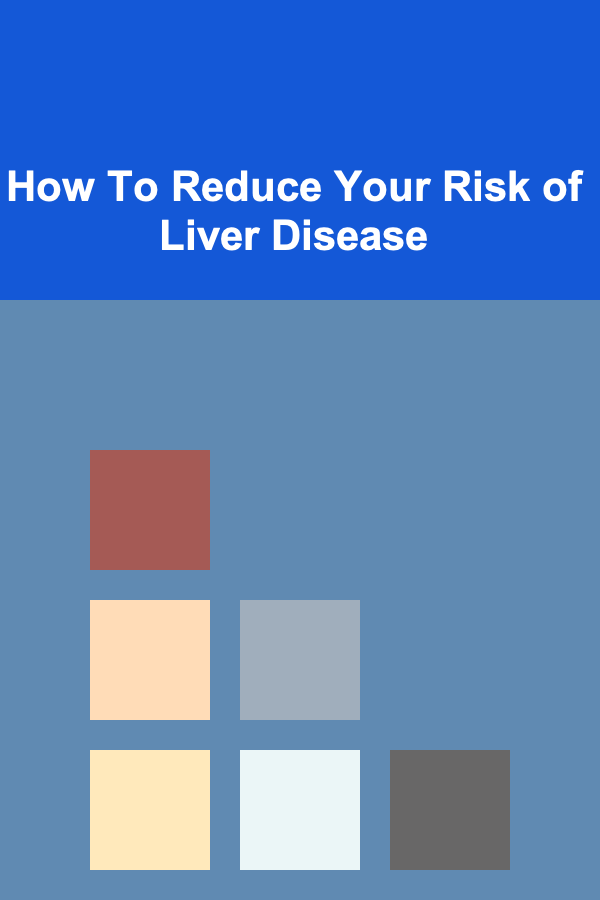
How To Reduce Your Risk of Liver Disease
ebook include PDF & Audio bundle (Micro Guide)
$12.99$9.99
Limited Time Offer! Order within the next:

The liver is one of the most vital organs in the human body. It is responsible for processing nutrients from food, detoxifying harmful substances, producing bile to help digest fats, and regulating various metabolic processes. As such, maintaining a healthy liver is essential for overall well-being. However, liver diseases, including fatty liver disease, cirrhosis, hepatitis, and liver cancer, are becoming increasingly common globally. Fortunately, there are several steps you can take to reduce the risk of liver disease and promote long-term liver health.
In this article, we will explore the factors that contribute to liver disease, the steps you can take to prevent it, and the importance of a healthy lifestyle in maintaining liver function.
Understanding Liver Disease
Liver disease refers to any condition that damages the liver and impairs its ability to function. Liver disease can range from mild conditions, such as fatty liver disease, to more severe forms like cirrhosis, liver failure, or liver cancer. The risk factors for liver disease are diverse and can include lifestyle choices, genetic predispositions, infections, and environmental exposures.
Types of Liver Disease
- Fatty Liver Disease (NAFLD): This condition occurs when excess fat accumulates in the liver, leading to inflammation and liver damage. Non-alcoholic fatty liver disease (NAFLD) is the most common form, often associated with obesity, diabetes, and poor diet.
- Hepatitis: Hepatitis is an inflammation of the liver, often caused by viral infections such as hepatitis A, B, C, D, or E. Chronic hepatitis can lead to cirrhosis, liver failure, or liver cancer.
- Cirrhosis: Cirrhosis is the scarring of the liver tissue, which occurs as a result of long-term liver damage. This scarring impairs liver function and can lead to complications such as liver failure, variceal bleeding, and ascites.
- Liver Cancer: Liver cancer, also known as hepatocellular carcinoma, is often the result of chronic liver disease, including cirrhosis and hepatitis B or C infections. It is a leading cause of cancer-related deaths worldwide.
- Alcoholic Liver Disease: Excessive alcohol consumption is a major cause of liver damage. Chronic alcohol use can lead to alcoholic fatty liver disease, alcoholic hepatitis, and cirrhosis.
Risk Factors for Liver Disease
Several factors contribute to the risk of liver disease. Some of the most common include:
- Obesity and Poor Diet: A high-fat, high-sugar diet can lead to the accumulation of fat in the liver, which increases the risk of fatty liver disease and other liver conditions.
- Excessive Alcohol Consumption: Drinking alcohol in excess can lead to liver damage, alcoholic hepatitis, and cirrhosis.
- Viral Infections: Hepatitis viruses (A, B, and C) are major causes of liver disease. Chronic infections can result in cirrhosis and liver cancer.
- Genetic Factors: Certain genetic conditions, such as hemochromatosis and Wilson's disease, can increase the risk of liver disease.
- Medications and Toxins: Prolonged use of certain medications and exposure to environmental toxins can harm the liver.
- Age and Gender: Older adults and men are generally at higher risk for liver disease.
Steps to Reduce Your Risk of Liver Disease
1. Maintain a Healthy Weight
One of the most significant factors in reducing your risk of liver disease is maintaining a healthy weight. Obesity is strongly linked to non-alcoholic fatty liver disease (NAFLD), a condition in which excess fat builds up in the liver. Over time, this can lead to inflammation, fibrosis, cirrhosis, and eventually liver failure. Maintaining a healthy weight can help prevent this condition and improve liver function.
How to Achieve and Maintain a Healthy Weight:
- Balanced Diet: Focus on eating a well-rounded diet that includes plenty of fruits, vegetables, lean proteins, whole grains, and healthy fats. Avoid processed foods, refined sugars, and excessive intake of unhealthy fats.
- Regular Physical Activity: Engaging in regular physical exercise, such as walking, running, cycling, or strength training, can help you maintain a healthy weight and reduce fat buildup in the liver.
- Portion Control: Eating appropriate portion sizes can help control your calorie intake and prevent overeating, which can contribute to weight gain.
- Track Progress: Monitor your weight and waist circumference regularly to track your progress and ensure you're staying within a healthy range.
2. Limit Alcohol Consumption
Excessive alcohol consumption is one of the leading causes of liver disease. Alcoholic liver disease can progress to fatty liver, alcoholic hepatitis, cirrhosis, and even liver cancer. To protect your liver, it's essential to limit alcohol intake or avoid it altogether.
How to Limit Alcohol Consumption:
- Stick to Guidelines: Follow the recommended guidelines for alcohol consumption. For example, most health organizations suggest that men should have no more than two drinks per day, and women should have no more than one.
- Take Breaks: Avoid drinking alcohol every day. Incorporating alcohol-free days into your routine can give your liver time to recover.
- Avoid Binge Drinking: Binge drinking (consuming large quantities of alcohol in a short period) can severely damage the liver and increase the risk of liver disease.
- Seek Support: If you're struggling to control your alcohol intake, consider seeking support from a healthcare professional, counselor, or support group.
3. Get Vaccinated Against Hepatitis
Hepatitis is a viral infection that causes inflammation of the liver. Vaccination is an effective way to reduce your risk of contracting hepatitis A and hepatitis B, both of which can cause severe liver damage if left untreated.
How to Get Vaccinated:
- Hepatitis A: The hepatitis A vaccine is recommended for people who are at risk of exposure, including travelers to certain regions, people with chronic liver disease, and those with a history of substance abuse.
- Hepatitis B: The hepatitis B vaccine is recommended for all infants, as well as adults at risk of infection, such as healthcare workers, people with multiple sexual partners, and individuals with chronic conditions like diabetes.
- Hepatitis C: While no vaccine is available for hepatitis C, it's important to avoid practices that increase the risk of transmission, such as sharing needles or engaging in unsafe sexual practices.
4. Protect Yourself from Hepatitis C
Hepatitis C is a viral infection that is primarily spread through blood-to-blood contact. While there is no vaccine for hepatitis C, you can reduce your risk by following safe practices.
How to Protect Yourself from Hepatitis C:
- Avoid Sharing Needles: If you use intravenous drugs, never share needles or other drug paraphernalia. Consider seeking professional help for addiction.
- Practice Safe Sex: Hepatitis C can be transmitted through sexual contact, so using barrier methods like condoms can reduce the risk of infection.
- Get Regular Screenings: If you think you may have been exposed to hepatitis C, get screened by a healthcare professional. Early detection can prevent complications.
- Be Cautious with Tattoos and Piercings: Ensure that the shop you go to follows proper sterilization procedures for their equipment.
5. Be Cautious with Medications and Toxins
Certain medications, herbal supplements, and environmental toxins can have adverse effects on the liver. Some medications can cause liver damage, especially when taken over long periods or in high doses.
How to Protect Your Liver from Medications and Toxins:
- Follow Dosage Instructions: Always take medications according to your healthcare provider's instructions. Avoid taking more than the prescribed dose, as this can increase the risk of liver damage.
- Avoid Self-Medicating: Never self-medicate with over-the-counter drugs or herbal supplements without consulting a healthcare professional, as many substances can harm the liver.
- Limit Exposure to Chemicals: Be cautious when using chemicals like cleaning agents, pesticides, and industrial solvents. These substances can be toxic to the liver, so use them in well-ventilated areas and wear protective gear if necessary.
6. Eat a Liver-Friendly Diet
A healthy diet plays a significant role in liver health. Certain foods can promote liver function, reduce inflammation, and prevent fat accumulation in the liver.
Foods that Support Liver Health:
- Leafy Greens: Kale, spinach, and other leafy greens are rich in antioxidants and help reduce liver inflammation.
- Cruciferous Vegetables: Vegetables like broccoli, Brussels sprouts, and cauliflower help detoxify the liver and support its natural detoxification processes.
- Healthy Fats: Foods rich in omega-3 fatty acids, such as fish, flaxseeds, and walnuts, can help reduce liver fat and inflammation.
- Garlic and Turmeric: Both garlic and turmeric have anti-inflammatory properties and can help protect the liver from damage.
- Green Tea: Green tea contains catechins, antioxidants that may help improve liver function and prevent fat buildup.
7. Stay Hydrated
Drinking plenty of water is crucial for maintaining good liver health. Staying hydrated helps flush toxins from the body and supports overall organ function.
How to Stay Hydrated:
- Drink Water Regularly: Aim to drink at least 8-10 cups of water a day, or more if you're physically active or live in a hot climate.
- Avoid Sugary Drinks: Limit your consumption of sugary drinks, sodas, and excessive caffeine, as they can contribute to liver damage and fat accumulation.
8. Exercise Regularly
Regular physical activity is essential for maintaining a healthy weight, reducing fat buildup in the liver, and improving overall liver function. Exercise also helps regulate blood sugar levels and reduces the risk of developing conditions like type 2 diabetes, which can contribute to liver disease.
How to Incorporate Exercise into Your Routine:
- Aim for 150 Minutes a Week: The American Heart Association recommends at least 150 minutes of moderate aerobic activity (like brisk walking or cycling) per week, or 75 minutes of vigorous activity.
- Strength Training: Incorporate strength training exercises at least two days a week to build muscle and boost metabolism.
Conclusion
Liver disease is a serious health concern, but the good news is that many of its risk factors are within our control. By adopting a healthy lifestyle, limiting alcohol consumption, maintaining a healthy weight, and protecting yourself from infections, you can significantly reduce your risk of liver disease. Additionally, regular exercise, a balanced diet, and staying hydrated will support liver health and help your liver perform its vital functions.
Reading More From Our Other Websites
- [Personal Investment 101] How to Avoid Investment Scams: Protecting Your Money in a Fraudulent World
- [Personal Financial Planning 101] How to Start Saving for Retirement in Your 40s
- [Personal Investment 101] How to Build Wealth Through Peer-to-Peer Lending
- [Home Pet Care 101] How to Introduce a New Puppy to a Senior Dog
- [Home Family Activity 101] How to Plan a Family Movie Marathon on a Budget
- [Personal Finance Management 101] How to Manage Your Cash Flow Effectively
- [Gardening 101] Garden Fence Designs: Creative Solutions for Every Garden
- [Ziplining Tip 101] How to Choose a Family‑Friendly Zipline Course with Comprehensive Safety Certifications
- [Simple Life Tip 101] Best Minimalist Morning Routines for a Stress‑Free Start
- [Home Family Activity 101] How to Plan a Family Yoga Session for Relaxation and Bonding

How to Keep Your House Smelling Fresh All Day Long
Read More
How to Organize and Clean Your Bathroom Cabinets
Read More
How to Organize Your Outdoor Gear for Easy Access
Read More
Navigating Troubleshooting Challenges as an Application Support Analyst
Read More
How to Cook with Cast Iron Skillets
Read More
How to Create a Mortgage Appointment To-Do List: A First-Time Buyer's Guide
Read MoreOther Products

How to Keep Your House Smelling Fresh All Day Long
Read More
How to Organize and Clean Your Bathroom Cabinets
Read More
How to Organize Your Outdoor Gear for Easy Access
Read More
Navigating Troubleshooting Challenges as an Application Support Analyst
Read More
How to Cook with Cast Iron Skillets
Read More